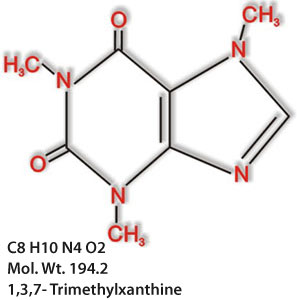
Natural Caffeine (CAS 58-08-2)
Market Research Report 2019

The study ‘Natural Caffeine (CAS 58-08-2) Market Research Report
2019’ presents an overview of the Natural Caffeine market globally
and regionally by contemplating and analyzing its parameters.
Key features of the report:
- provides general information on Natural Caffeine
- examines applications of Natural Caffeine, its consumers
- provides an overview of the Natural Caffeine market and supplies a
list of Natural Caffeine manufacturers and suppliers worldwide
- considers Natural Caffeine current market prices
The research is based on reliable data and supplies the latest
information on selected aspects of the market.
1. GENERAL NATURAL CAFFEINE DESCRIPTION,
COMPOSITION, INFORMATION ON INGREDIENTS, HAZARDS IDENTIFICATION,
HANDLING AND STORAGE, TOXICOLOGICAL AND ECOLOGICAL INFORMATION,
TRANSPORT INFORMATION
2. NATURAL CAFFEINE APPLICATION AREAS, PATENTS
3. NATURAL CAFFEINE MARKET. MANUFACTURERS AND TRADERS OF NATURAL
CAFFEINE (INCLUDING CONTACT DETAILS)
3.1. Manufacturers of Natural Caffeine
- Europe
- Asia
- North America
- Latin America
3.2. Suppliers (trading companies) of Natural Caffeine (including
contact details)
- Europe
- Asia
- North America
4. CURRENT NATURAL CAFFEINE MARKET PRICES
- European market
- Asian market
- North American market
5. NATURAL CAFFEINE CONSUMERS
- Europe
- Asia
- North America
- Latin America
- Africa
- Oceania .

>>
New Product
Introduced :
Oseltamivir
Phosphate,
Phenyl Propanolamine,
Phenylephrine,
Etafedrine,
Caffeine

|
![Caffeine Cas No. [58-08-2]](caffeine/caffeine_TAJ%20APIe.jpg)
We all know that one of the most
powerful chemical compounds found in both coffee and tea is
caffeine. Has caffeine become an important part of your daily life?
Did you know
Article : What Is Caffeine?
 Caffeine is a drug that is naturally
produced in the leaves and seeds of many plants. It's also produced
artificially and added to certain foods. Caffeine is defined as a
drug because it stimulates the central nervous system, causing
increased alertness. Caffeine gives most people a temporary energy
boost and elevates mood. Caffeine is a drug that is naturally
produced in the leaves and seeds of many plants. It's also produced
artificially and added to certain foods. Caffeine is defined as a
drug because it stimulates the central nervous system, causing
increased alertness. Caffeine gives most people a temporary energy
boost and elevates mood.
Caffeine is in tea, coffee, chocolate, many soft drinks, and pain
relievers and other over-the-counter medications. In its natural
form, caffeine tastes very bitter. But most caffeinated drinks have
gone through enough processing to camouflage the bitter taste.
Teens usually get most of their caffeine from soft drinks and energy
drinks. (In addition to caffeine, these also can have added sugar
and artificial flavors.) Caffeine is not stored in the body, but you
may feel its effects for up to 6 hours.
 |


